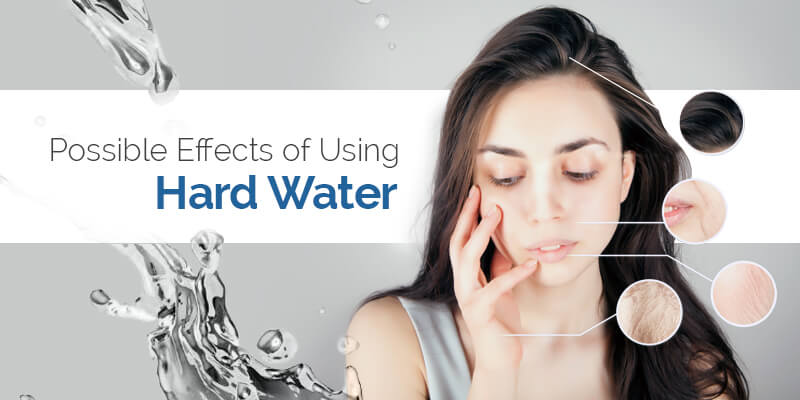What Makes Water Hard?
Hard water contains high levels of minerals such as magnesium and calcium. These mineral deposits are naturally occurring when water flows through chalk and limestone before entering the water supply.
If you live in a hard water area, you may notice white, chalky deposits on your taps and inside your kettle. On top of this, freshly laundered clothes may feel rough to the touch, and white stains can be deposited on your laundry.
Whilst there are no problems associated with drinking hard water, it can affect the water’s quality when you use if for showering or bathing. You may find it hard to build up a lather using hard water and this can cause issues with your hair and skin, which we will look at below:
How Hard Water Affects Your Skin
Hard water can cause a few different problems with skin.
Generally, the minerals in hard water are more likely to dry out the skin. These deposits can block skin pores, leading to flakiness, breakouts or itchiness. This also means that skin conditions such as psoriasis and eczema are more common in hard water areas.
Hard water minerals will also absorb the skin’s natural moisture and oils, leaving it dryer.
If you are already suffering from some sort of skin condition, washing in hard water can make it worse.
Washing Your Hair with Hard Water
Just as hard water can affect the skin on your body, so it can also have an impact on your scalp.
The scalp needs as much hydration as the rest of the body’s skin, and hard water can block pores and absorb natural oils here too.
Hair can block the porosity of the skin on your scalp, so washing it with hard water will exacerbate any dry scalp conditions.
Symptoms include flaky skin and some degree of irritation.
Also, your hair itself may appear flat and lifeless and feel rough because the hard water erodes its elasticity and lifts the cuticles.
Reversing Hard Water Damage on Skin and Hair
There are certain measures you can take with your washing regime to reverse this damage.
Yoghurt-based skin cleansers can remove debris and makeup without requiring you to rinse them off. This is from the action of the lactic acid occurring in yoghurt.
Also, find a good body lotion and apply it regularly and diligently to combat the effects of hard water.
It’s vital to rehydrate and rebalance your skin if you wash regularly with hard water.
Similarly, for your hair, invest in a scalp-cleanser to clear away debris, and a dry scalp treatment to restore moisture. Use a clarifying or a chelating shampoo.
Clarifying shampoos will break down hard water residue; while chelating shampoos attach themselves to hard water mineral deposits and then whisk them away.
Fixing Your Hard Water
Whether you have well water or city water, the water you use for drinking, hygiene, and food preparation can contain contaminants such as bacteria and chemicals that could harm your family’s health. A whole home water filtration system is the ideal solution to remove these pollutants and ensure that your water is not hard and it’s safe.
If you find you are experiencing some of the issues above, you may want to consider how you can limit your exposure to hard water before it comes into contact with your hair and skin.
One way of combatting with the effects of hard water when you wash is to deal with the source of the problem.There are various options when it comes to water treatment for your home, from water filters fitted to individual taps and shower heads to whole home solutions such as water softeners.
Obviously, this might be a longer-term investment when compared to the skin and hair-care solutions mentioned above, but it means you can limit your exposure to hard water, ultimately helping your skin and hair to feel and look their best.

